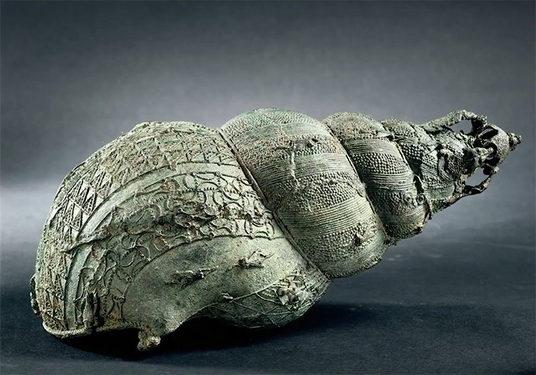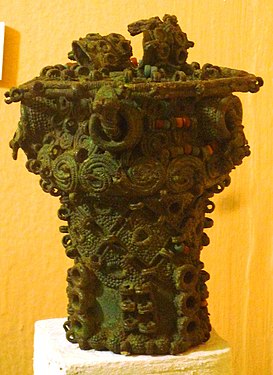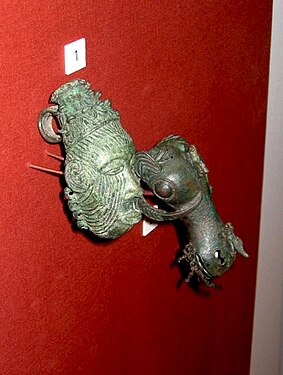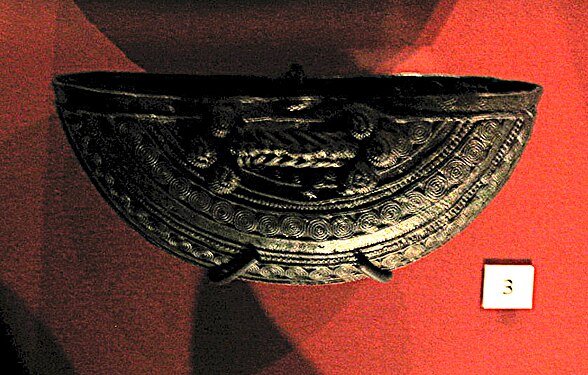
A | B | C | D | E | F | G | H | CH | I | J | K | L | M | N | O | P | Q | R | S | T | U | V | W | X | Y | Z | 0 | 1 | 2 | 3 | 4 | 5 | 6 | 7 | 8 | 9
This article needs additional citations for verification. (February 2023) |
Igbo-Ukwu | |
|---|---|
 9th century Igbo-Ukwu bronze ceremonial staff head | |
| Coordinates: 6°1′N 7°1′E / 6.017°N 7.017°E | |
| Country | Nigeria |
| State | Anambra |
| LGA | Aguata |
| Government | |
| • King | Igwe (His Royal Highness) Martin N. Ezeh (Idu II)[1] |
| Population (2007) | |
| • Total | 79,317 |
| • Ethnicity | Igbo 99% |
| • Religion | Christianity Odinani |
| Time zone | UTC+1 (WAT) |
Igbo-Ukwu (English: Great Igbo) is a town in the Nigerian state of Anambra in the south-central part of the country. The town comprises three quarters namely Obiuno, Ngo, and Ihite (an agglomeration of 4 quarters) with several villages within each quarter and thirty-six (36) administrative wards. It is also bordered by Ora-eri, Ichida, Azigbo, Ezinifite, Amichi, Isuofia, Ikenga and some other towns.[2]
Archaeological significance

Igbo-Ukwu is notable for three archaeological sites, where excavations have found bronze artifacts from a highly sophisticated bronze metal-working culture dating to 9th century AD, centuries before other known bronzes of the region.
The first, called Igbo Isaiah, was uncovered in 1938 by Isaiah Anozie, a local villager, who found the bronze works while digging beside his home. Five bronze artifacts from the original excavation are now in the British Museum's collection.[3] They include a small staff, a head of a ram, a large manilla, an intricately designed crescent-shaped vessel and a small pendant in the shape of a local chief's head with scarification (ichi) marks on the face.
Formal excavations by the archaeologist Thurstan Shaw in 1959 at the request of the Nigerian government, resulted in the discovery of two other sites, Igbo Richard and Igbo Jonah, containing the remains of an ancient culture. Later, these were excavated as well. Artifacts have included jewelry, ceramics, a corpse adorned in what appears to be regalia, and many assorted bronze, copper, and iron objects. Some of these contain materials that are evidence of a long-distance trading system extending to Egypt.
Radiocarbon dating placed the sites to 850 AD,[4] which would make the Igbo-Ukwu culture the earliest-known example of bronze casting in the region. The archaeological sites in southeastern Nigeria are associated with the Nri-Igbo. The three sites include Igbo Isaiah (a shrine), Igbo Richard (a burial chamber), and Igbo Jonah (a cache). Artifacts found in these sites have shown that by the 9th century AD, the Igbo-Ukwu people had established a complex religious system and an economy based on agriculture and trade with other African peoples as far as the Nile valley.
History
Artifact of Igbo ukwu
Alice Apley writes about the work:
"The inhabitants of Igbo-Ukwu had a metalworking art that flourished as early as the ninth century. Three sites have been excavated, revealing hundreds of ritual vessels and regalia castings of bronze or leaded bronze that are among the most inventive and technically accomplished bronzes ever made. The people of Igbo-Ukwu (originally known as Igbo-Nkwo), ancestors of present-day Igbo, were the earliest smithers of copper and its alloys in West Africa, working the metal through hammering, bending, twisting, and incising. They are likely among the earliest groups of West Africans to employ the lost-wax casting techniques in the production of bronze sculptures. Oddly, evidence suggests that their metalworking repertory was limited and Igbo smiths were not familiar with techniques such as raising, soldering, riveting, and wire making, though these techniques were used elsewhere on the continent."[5]
Gallery
-
Igbo ukwu face pendant
-
Double egg pendant, leaded bronze, 9th-10th century, unearthed in Igbo Ukwu, Anambra
-
Shell Vessel with Leopard from Igbo-Ukwu
-
Igbo-ukwu bowl
-
Bronze pot, Igbo-Ukwu
-
Bronze ceremonial vessel in form of a snail shell, 9th century, Igbo-Ukwu
-
Igbo ukwu Vass
-
Bronze ornamental staff head, 9th century, Igbo-Ukwu
-
Intricate bronze ceremonial pot, 9th century, Igbo-Ukwu, Nigeria
-
Intricate ornamental staff head, 9th century, bronze, Igbo-Ukwu
-
Igbo ukwu bronzes
-
Igbo ukwu pendant
-
Glass beads from Igbo-Ukwu
-
Igbo-Ukwu textile
-
High priest
-
Cresentric bowl, bronze, 9th century, Igbo-Ukwu
-
Igbo Ukwu vessel
Climate
In Igbo-Ukwu, the dry season is muggy and partially cloudy, and the climate is warm all year round. The wet season is oppressive and overcast. The average annual temperature fluctuates between 64°F and 85°F, rarely falling below 56°F or rising over 88°F.[6]
The difference in temperature in Igbo-Ukwu is so little throughout the year that talking about hot and cold seasons isn't really helpful.[7]
See also
References
- ^ Rothmans, William (25 February 2014). "Igwe Eze Calls On FG To Expand Roads". Orient Newspaper. Retrieved 19 April 2014.
- ^ Fidesnigeria (5 May 2013). "Tension Grips Igboukwu* Leadership Crisis, Gunmen Hold Town Hostage". Archived from the original on 19 April 2014. Retrieved 19 April 2014.
- ^ British Museum Collection
- ^ Thurstan Shaw, Those Igbo-Ukwu radiocarbon dates: facts, fictions, and probabilities, Journal of African History, 1975
- ^ Apley, Alice. "Igbo-Ukwu (ca. 9th century)". Metropolitan Museum of Art. Retrieved 2008-11-23.
- ^ "Igbo-Ukwu Climate, Weather By Month, Average Temperature (Nigeria) - Weather Spark". weatherspark.com. Retrieved 2023-08-12.
- ^ "Simulated historical climate & weather data for Igbo-Ukwu". meteoblue. Retrieved 2023-08-12.
External links
- Apley, Alice (October 2001). "Igbo-Ukwu (ca. 9th century)". Heilbrunn Timeline of Art History. New York: Metropolitan Museum of Art, 2000.
Text je dostupný za podmienok Creative Commons Attribution/Share-Alike License 3.0 Unported; prípadne za ďalších podmienok. Podrobnejšie informácie nájdete na stránke Podmienky použitia.
Abomey
Adjassou-Linguetor
Adya Houn'tò
African-American religion
African diaspora in the Americas
African diaspora religions
African divination
African philosophy
Agassou
Agwé
Aja people
Akan religion
Alfred Burdon Ellis
Anaisa Pye
Androgyny
Angel
Arará religion
Autoritní kontrola
Ayida-Weddo
Ayizan
Azaka-Tonnerre
Baluba mythology
Bandiagara Escarpment
Bantu religion
Baron Criminel
Baron Samedi
Belie Belcan
Benin
Benin City
Bossou Ashadeh
Boum'ba Maza
Bugid Y Aiba
Bushongo mythology
Bwiti
Candomblé
Candomblé Jejé
Captain Debas
Christianity
Clermeil
Colonisation of Africa
Cosmogony
Creator deity
Cuban Vodú
Dahomean religion
Dahomey
Damballa
Dan Petro
Diable Tonnere
Diejuste
Digital object identifier
Dinclinsin
Dingir (časopis)
Dini Ya Msambwa
Dinka religion
Divination
Dogon religion
Doi (identifier)
Dominican Vudú
Domorodá náboženství
Eclecticism
Efik mythology
Erzulie
Ewe language
Ewe people
Fatick
Fetishism
File:Akodessawa Fetish Market 2005.jpg
File:Akodessawa Fetish Market 2008.jpg
File:Akodessawa Fetish Market 2016.jpg
File:Booth at Akodessawa Fetish Market 2008.jpg
File:Booth at Akodessawa Fetish Market 2016.jpg
File:Brooklyn Museum 1989.51.39 Nommo Figure with Raised Arms.jpg
File:COLLECTIE TROPENMUSEUM Houten masker TMnr 6372-2.jpg
File:Preparation of a bat at Akodessawa Fetish Market for Voodoo rituals.jpg
File:Skulls at Akodessawa Fetish Market 2008.jpg
File:Skulls at Akodessawa Fetish Market 2016.jpg
File:Voodo-altar.jpg
File:Voodo-fetischmarkt-Lomé.jpg
File:Voodoo.jpg
Filomez
Fon language
Fon people
Gemeinsame Normdatei
Ghana
Gran Maître
Gris-gris (talisman)
Guédé-Double
Guédé-Linto
Guede
Guede L'Orage
Guede Nibo
Gun language
Haiti
Haitian mythology
Haitian Vodou
Haitian Vodou art
Hausa animism
Help:Authority control
Help:CS1 errors#periodical ignored
Help:IPA
Heviosso
High priestess
Hogon
Hoodoo (folk magic)
Hoodoo (spirituality)
Houngan
Ifá
Ifẹ
Igbo-Ukwu
Intercession of saints
International Standard Book Number
Internet Archive
ISBN (identifier)
Islam
ISO 3166-2:BJ
ISSN (identifier)
Jorubové
Joseph Danger
JSTOR (identifier)
Juju
Kabiye
Kalfu
Kanem–Bornu Empire
Kingdom of Sine
Kongo religion
Kushite religion
L’Aube Nouvelle
Legba
Library of Congress Control Number
LIBRIS
List of African mythological figures
Loa
Lomé
Lotuko mythology
Louisiana Voodoo
Lozi mythology
Lugbara mythology
Maîtresse Délai
Maîtresse Hounon'gon
Maasai mythology
Mademoiselle Charlotte
Maman Brigitte
Mambo (Vodou)
Marassa Jumeaux
Marinette (loa)
Mawu
Mbuti mythology
Mombu
Mounanchou
Mount Hombori
Multiple religious belonging
Národní knihovna České republiky
Národní knihovna Izraele
Nana Buluku
Nasal vowel
Ndut initiation rite
Nebeská cirkev Kristova
New World
Nigeria
Nommo
Nri-Igbo
Nsukka
Odinala
Ogun
Okuyi
Ondřej Havelka (cestovatel)
Ouidah
Oyo, Oyo
Papa Legba
Persecution of traditional African religions
Phallus
Pie (loa)
Point of Sangomar
Polytematický strukturovaný heslář
Portal:Traditional African religion
Portal:Traditional African religions
Porto Novo
Priestly caste
Q177764#identifiers
Q177764#identifiers|Editovat na Wikidatech
Queen mothers in Africa
Religious cosmology
Religious persecution#Persecution of Dogons
Religious persecution#Persecution of Serers
Roman Catholic
S2CID (identifier)
Saltigue
Sangha, Mali
Sangha Ogol Leye
Santería
San religion
Serer religion
Shango
Simbi
Sine River
Sirius#Dogon
Sirius#Serer spirituality
Sobo (deity)
Somb
Soubor:Vodun statue in Benin.jpg
Soubor:Voodo-altar.jpg
Sousson-Pannan
Speciální:Zdroje knih/978-80-87580-24-0
Syncretic religion
Syncretism
Tambor de Mina
Tattaguine
Template:Cite book
Template:Traditional African religions
Template:Voodoo sidebar
Template talk:Traditional African religions
Template talk:Voodoo sidebar
The Journal of Negro History/Volume 7/Number 1/Slave Society on the Southern Plantation
Ti Jean Petro
Ti Jean Quinto
Ti Malice and Bouki
Togo
Tone (linguistics)
Traditional African religions
Traditional African religion and other religions
Trinidadian Vodunu
Tukar
Tumbuka mythology
Vúdú
Veneration of the dead
Veve
Vlajka Beninu
Vodun
Vodun art
Voodoo (disambiguation)
Waaqeffanna
Wayback Machine
West Africa
West African mythology
Wikimedia Commons
Wikipedia:Contents/Portals
Winti
Witchcraft
Witch doctor
Yaboyabo
Yoruba religion
Youga Dogorou
Zangbeto
Zulu traditional religion
Text je dostupný za podmienok Creative
Commons Attribution/Share-Alike License 3.0 Unported; prípadne za ďalších
podmienok.
Podrobnejšie informácie nájdete na stránke Podmienky
použitia.
www.astronomia.sk | www.biologia.sk | www.botanika.sk | www.dejiny.sk | www.economy.sk | www.elektrotechnika.sk | www.estetika.sk | www.farmakologia.sk | www.filozofia.sk | Fyzika | www.futurologia.sk | www.genetika.sk | www.chemia.sk | www.lingvistika.sk | www.politologia.sk | www.psychologia.sk | www.sexuologia.sk | www.sociologia.sk | www.veda.sk I www.zoologia.sk


















